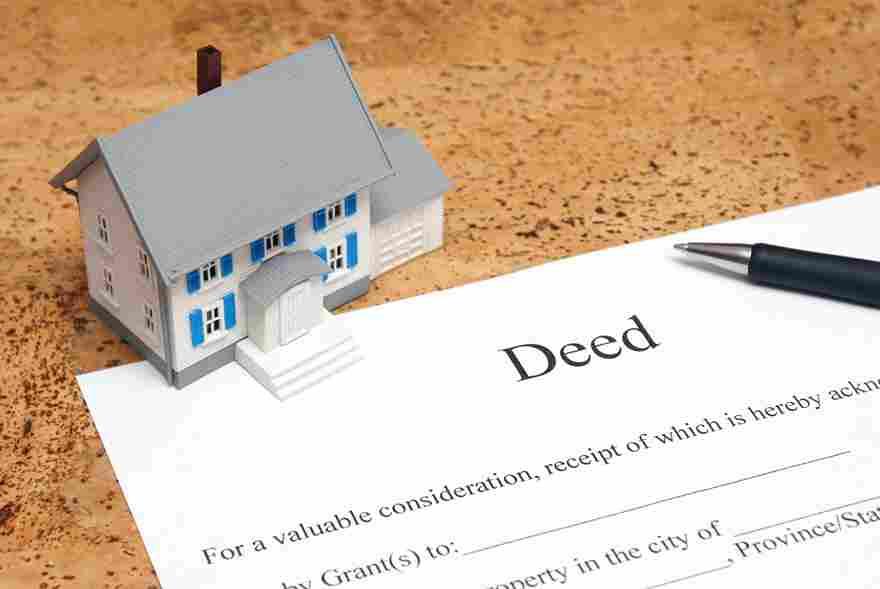Buying a home is an exciting time! It's one of the biggest investments you can make and can often be overwhelming. There are numerous steps during the process, from securing financing to signing paperwork at closing.
You'll need to sign the property deed that officially transfers real estate ownership from a seller to a buyer.
But what exactly does this important document include, and why? This blog post will discuss everything you should know about understanding property deeds when buying your home.

What is a property deed, and what does it include?

A property deed is a legal document the seller gives the buyer during the closing process. This document conveys ownership of real estate from one party to another, and it typically includes information such as the grantor's (seller's) name; grantee's (buyer) name; address of the property; legal description of the property; and any other provisions or restrictions that may be applicable.
How can you find a copy of your property deed?
If you need a copy of your property deed, the best place to start is with the county records department or clerk's office in the jurisdiction where the property is located.
These offices typically keep copies of all recorded documents, so they usually have a copy of your deed on file. Alternatively, you can find a copy of your deed online from the county website or through a third-party vendor. It's also possible for you to request a copy of your deed directly from the seller, although this should be done in writing and with an attorney present.
What are the different types of deeds available to homeowners in the United States?
In the United States, there are typically four different types of deeds available to homeowners: general warranty deed, special warranty deed, quitclaim deed, and trustee's deed.
A general warranty deed provides the most protection for a buyer because it guarantees title from any past defects or encumbrances in the property.
A special warranty deed provides more limited protection than a general warranty deed because it only covers defects created by the current owner during their ownership of the property, as opposed to any past owners.
A quitclaim deed transfers whatever interest the grantor may have in the property, regardless of how many titles they have.
A trustee's deed is used when a property is sold as part of a foreclosure or bankruptcy sale, and the title transfers to the buyer from the trustee of the sale.
How do you change or update your property deed after buying or selling a home?
The process is relatively simple if you need to change or update your property deed after buying or selling a home. You will need to contact the county records department and request a copy of your existing deed.
Once you have this document, you can make any necessary changes before submitting it for recording with the county clerk. It's important to note that you will need to have the deed notarized or signed by a witness for it to be accepted. After recording, the county clerk will issue a new deed with the updated information.
Understanding property deeds is important in buying a home and protecting your investment.
Be sure to familiarize yourself with the types of deeds available and any related legal documents before purchasing.
Doing your due diligence can help ensure that you have the right paperwork in place and can make buying or selling a home smoother and more successful.
What should you do if there's an error on your property deed or if it's lost or stolen?
If you find an error on your property deed or the document is lost or stolen, it's important to take action immediately.
You should contact the county records department and request a copy of your deed to verify any errors and make corrections as necessary.
If the document has been lost or stolen, you should also contact the local police department to report it and begin filing an insurance claim if applicable.
Depending on the situation, you may need to hire an attorney to help with any legal issues that arise from a lost or stolen deed.
Ultimately, understanding property deeds are essential for protecting your investment and ensuring peace of mind. You can ensure that your home is properly protected by taking the time to familiarize yourself with the process and related laws.
Can a homeowner sell their home without transferring the property deed first, and what are the risks involved in doing so?"
Yes, a homeowner can sell their home without transferring the property deed, but several risks are involved.
First, suppose the buyer takes possession of the property before the deed is transferred and something goes wrong with the sale (e.g., they default on payments or damage the home). In that case, the seller may be unable to recoup any losses due to a lack of legal documentation.
Additionally, if the deed is not transferred properly, there could be issues with the title that could cause complications down the line if the buyer decides to sell or refinance.
It is always best practice for a homeowner to transfer the property deed before selling their home to protect both parties involved.
How to get a copy of the property deed online
Getting a copy of your property deed online is a relatively easy process. You will need to contact the local county office that holds the deed records in your area. Many counties have websites where you can search for deeds and request copies.
FAQs
What is the most important element of a deed?
The most important element of a deed is the legal description. This includes details such as the transferred property's address, size, and shape. It also lists any restrictions or covenants associated with the land.
The legal description must be accurate to ensure that all parties know exactly what they're transferring ownership over.
What type of deed should I use?
The type of deed you use will depend on the state that you live in and the specifics of your situation. Generally, most states have three main types of deeds: warranty deeds, quitclaim deeds, and trustee deeds.
Warranty deeds are the most commonly used as they provide more protection to the buyer than the other two types.
What should I look out for before signing a deed?
Before signing a deed, it's important to ensure all information is correct and up-to-date. Additionally, you should read through the entire document carefully and ask any questions.
It's important to ensure that the legal description matches the property you are purchasing. Finally, make sure you understand any restrictions or covenants associated with the property before signing.
Conclusion
Property deeds are important legal documents conveying ownership of a property.
There are different types of property deeds, and it is important to understand which one you have to determine your rights as the owner.
If you are still determining the type of deed you have or your rights as the owner, you should consult an experienced attorney who can help you understand your situation.



